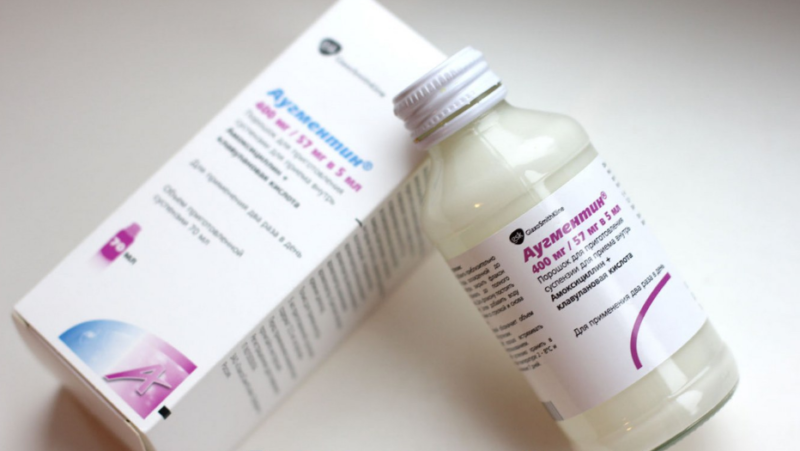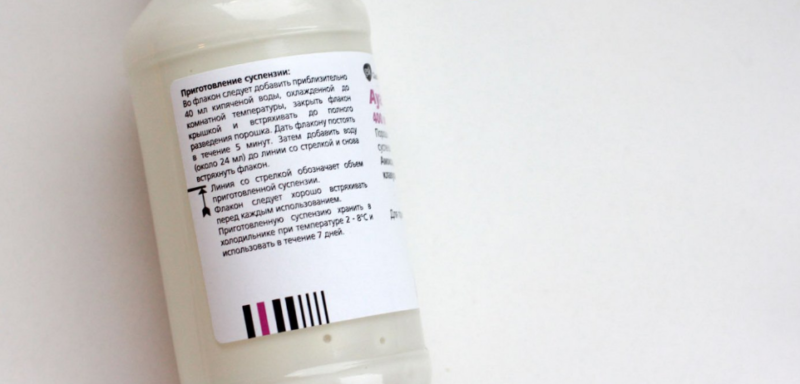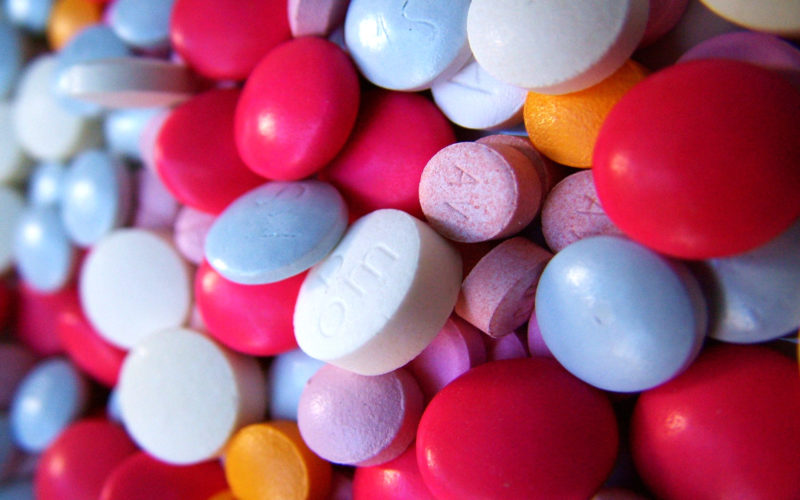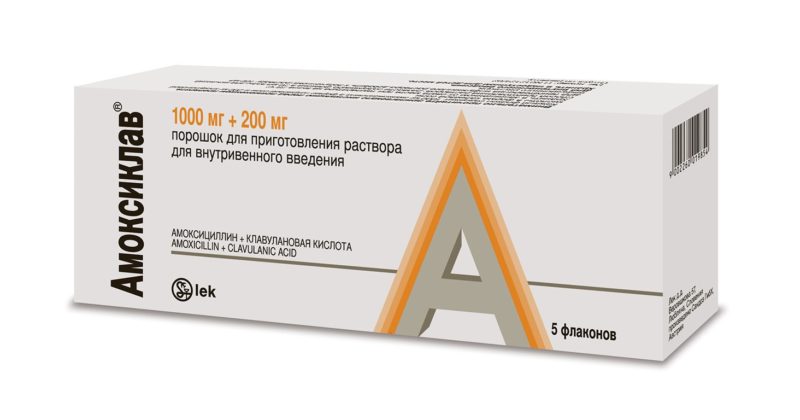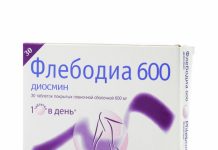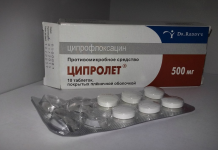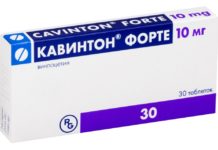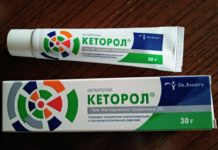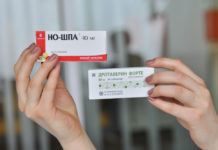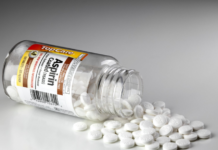When a child becomes ill in the family, parents seek the most effective, but at the same time safe methods of therapy. For diseases caused by the activity of pathogenic bacteria, pediatricians often prescribe Augmentin. From our article you will learn in what cases the suspension "Augmentin" for children is prescribed.
Material Content:
The composition (active substance) of the antibiotic
The medication is made in the form of crystalline powder for dilution of the suspension. It is based on amoxicillin and clavulanic acid (CC).
Pharmacological action, pharmacodynamics, pharmacokinetics
Antibiotic Augmentin has a wide area of action. Under its influence, aerobic and anaerobic bacteria die. Including it affects microorganisms synthesizing beta-lactamase, which can destroy penicillins. To protect them, KK is present in the medication, which increases the positive effect of the drug on the body.
After oral administration, all components of the drug are absorbed very quickly. They interact with plasma proteins: 24 percent for KK and 19 percent for amoxicillin. The medicine is excreted with urine.
In what cases is Augmentin suspension prescribed
The medication is prescribed for small patients who suffer from:
- bronchitis, lobar bronchopneumonia, empyema, pulmonary abscesses;
- skin ailments of bacterial origin;
- cystitis, urethritis, pyelonephritis, sepsis, syphilis, gonorrhea;
- osteomyelitis;
- septicemia;
- peritonitis.
Instructions for use and dosage for children.
According to the official guidelines, the dosage of Augmentin for children is set individually and depends on:
- the type and severity of the disease;
- patient age;
- its weight;
- liver and kidney conditions.
Suspension Augmentin 125, 250 mg
Children from three months to twelve years of age are prescribed this medication in the form of a suspension. Medicinal powder must be diluted with cold boiled water.
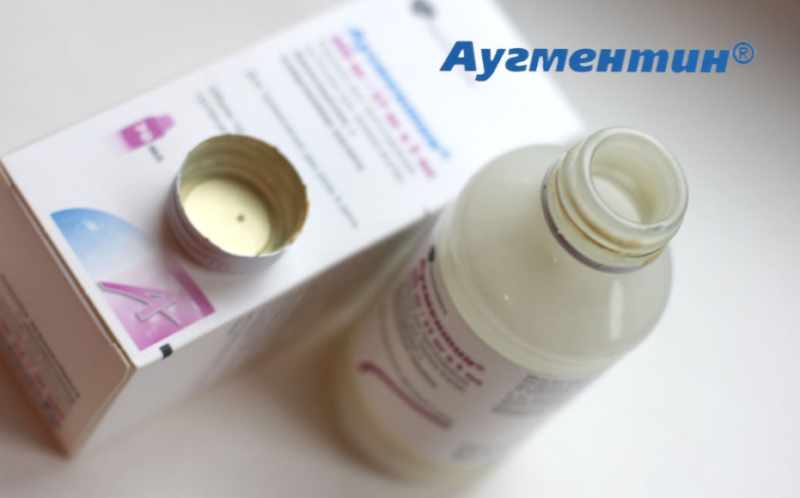
- First, the liquid must be poured into the bubble to the lower mark on it, shaken and left for several minutes.
- After, inspect the vial for powder. If it does not completely dissolve, then you need to shake the bottle again and leave again.
- If the powder is completely dispersed in the liquid, add water to the upper mark on the bottle.
- Suspension "Augmentin" for children is ready for use.
| Age | Weight (in kg) | 125 milligrams | Weight (in kg) | 200 milligrams |
|---|---|---|---|---|
| Up to a year | 2 − 5 | One and a half - two and a half ml three times a day | - | - |
| One to five years | 6 − 9 | Five milliliters three times a day | 10 − 18 | Five milliliters morning and evening |
| Six to nine years old | 19 − 28 | Fifteen milliliters three times in 24 hours | 19 − 28 | Seven and a half milliliters twice a day |
| Ten to twelve years | 29 − 39 | Twenty milliliters three times a day | 29 − 39 | Ten milliliters three times a day |
Powder for suspension 400, 600 mg
The maximum daily dose is 90 milligrams of amoxicillin and 6.4 milligrams of QA per kilogram of baby weight.
The dose is divided into two doses in the morning and evening. The duration of the therapeutic course is one and a half weeks.
Table with the approximate dosage of Augmentin:
| Age | Weight (in kg) | 400 mg |
|---|---|---|
| One to five years | 10 − 18 | Five ml morning and evening |
| Six to nine years old | 19 − 28 | Seven and a half ml twice daily |
| Ten to twelve years | 29 − 39 | Ten ml three times a day |
It is important to remember that for the best efficiency of a medical device it is necessary to adhere to a strict regimen of admission:
- If it is carried out twice a day, it means that exactly twelve hours should pass between receptions.
- In the case of three meals a day, the interval between the procedures is eight hours.
To avoid overdose or treatment inefficiency, it is worth consulting a doctor to determine the right dose.
Drug interaction
- It is recommended not to allow the simultaneous administration of Augmentin and probenecid. The latter negatively affects the tubular secretion of amoxicillin, as a result of which the concentration of this substance in the patient's body may increase.
- The use of Augmentin with allopurinol is fraught with the occurrence of various types of allergies with manifestations on the skin.
- Also, penicillin drugs, which include Augmentin, can significantly reduce the rate of cleansing the body of methotrexate. As a result, this can provoke intoxication of the body.
- Augmentin, like any antibiotic, can adversely affect the intestinal microflora. As a result, this can adversely affect the absorption of estrogen and the gastrointestinal tract.
- It is also possible a slight increase in INR in patients with the drug interaction of acenocumarol or warfarin and amoxicillin.
If there is a need for the combined use of Augmentin and an anticoagulant, then you need to control prothrombin time, or INR. At the end of the treatment with the Augmentin Medication, the attending physician must make changes in the dosage of anticoagulants.
Contraindications, side effects and overdose
The drug is forbidden to prescribe to patients who suffer from:
- hypersensitivity to any constituent substance "Augmentin";
- impaired renal function;
- phenylketonuria.
Also, the medication should not be prescribed to children who in the past had jaundice and problems with renal function caused by taking amoxicillin with CC.
Babies under three months of age cannot be treated with Augmentin.
Only when absolutely necessary is the medication prescribed for children with impaired hepatic functionality.
According to statistics, patients tolerate the medication well, however, in some children, its administration may be accompanied by such side effects:
- Fungal infection of the mucous membranes and epithelium.
- In CS: a reversible decrease in leukocytes and platelets, less often - agranulocytosis and hemolytic anemia, an increase in external blood coagulation and the duration of bleeding, thrombocytosis.
- From the protective system of the body: angioedema, anaphylactic shock, vasculitis.
- In the central NS: mental agitation, strange behaviors, sleep disturbances, nightmares, constant causeless anxiety, severe headache, vertigo, fainting, reversible hyperactivity. It is also possible convulsive lesions of the extremities in patients with impaired renal functionality when taking large doses of Augmentin.
- In the digestive tract: nausea, vomiting, discomfort and pain in the intestines and stomach, upset stool. The intensity of these manifestations can be significantly reduced if you drink the medicine immediately before eating. Also, taking the medication can be accompanied by colitis, darkening of tooth enamel, the surface of the tongue and stomatitis.
- In the biliary tract and liver function: high bilirubin, jaundice. These side effects are very rare in children. They were mainly observed in adult males or in elderly patients. The above adverse reactions may appear not only during the course of treatment, but also some time after its completion.
- On the skin: the possible occurrence of characteristic burn marks on the skin, as from contact with nettles, rashes, itching, toxic epidermal necrolysis, acute generalized exanthematous pustulosis. If there is evidence of an organism’s reaction to the Augmentin antibiotic, its use should be discontinued.
- In MS: the possible formation of crystals, the appearance of blood in urine, interstitial nephritis.
Signs of drug abuse are mainly expressed through the digestive tract. The child may experience nausea, vomiting, and loose frequent stools. The body is dehydrated, the amount of electrolytes in the blood is disturbed. Crystal formation is sometimes observed, which can lead to impaired renal function. Overuse of the drug can provoke convulsive lesions of the limbs.
Treatment of overdose symptoms converges to their elimination and normalization of the child’s water balance. To clear the organ systems of the components of the medicine 100% is possible only through hemodialysis.
Antibiotic Analogs
This medical device has many analogues, but a list of the most effective is presented:
- Amoxiclav;
- “Femoklava Solutab”;
- "Ecoclave."
Before using analogues, it is necessary to obtain the approval of a therapist. Each of them is forbidden to use as a means of self-treatment.
After analyzing the reviews, it can be noted that most of them are positive. Parents claim that Augmentin is effective against various infections and rarely causes negative effects. The drug begins to act almost immediately after use. Already on the 3rd - 5th day of therapy, the child begins to recover.
In general, pediatricians speak well of "Augmentin", however, to protect the child from adverse reactions, the drug can be used only for medical purposes. Any self-medication can greatly aggravate the health of a small patient.


